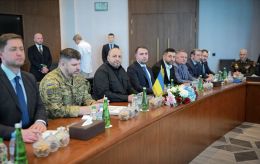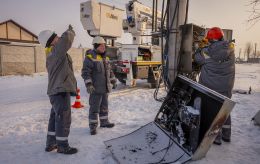Russia not interested in stopping or even pausing war - EU Ambassador to Ukraine
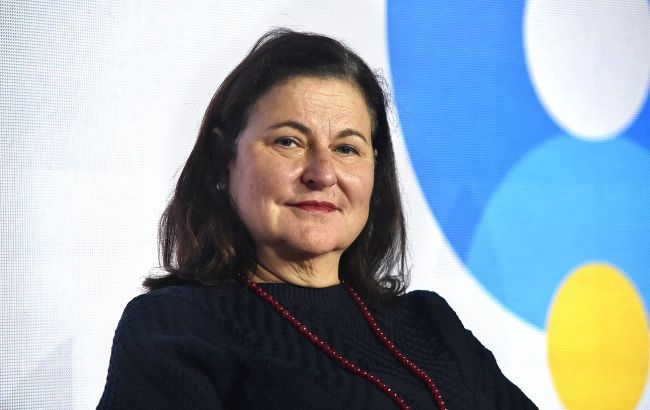 EU Ambassador Katarína Mathernová (photo: Serhii Chuzavkov / Ukrinform Future Publishing via GettyImages)
EU Ambassador Katarína Mathernová (photo: Serhii Chuzavkov / Ukrinform Future Publishing via GettyImages)
Sanctions against Russia, trade with the EU, Ukrainian reforms, accession negotiations, and whether Europe is ready to take the lead in the Western world, learn in an interview with EU Ambassador to Ukraine Katarína Mathernová for RBC-Ukraine.
Key questions:
- Will the EU continue to support Ukraine if the war ends?
- What can be achieved in this year's accession talks?
- Has Europe woken up after the US geopolitical shift?
- How will Ukraine trade with the EU after the end of trade preferences?
— Well, you wanted to start with trade, but I will go back to the fact that we are meeting 10th of June, when overnight, just the building across the street from the EU Delegation was hit. And a car in our parking lot got debris damage. So the Russian attacks are getting closer and closer to home. And so, just want to say that we are here and support Ukraine and go to the same shelters as you do. And I hope that this Russian terror will hopefully soon be over.
— The effect of the autonomous trade measures for Ukraine has ended, and now both sides have returned to their trade parameters that are in the DCFTA. Earlier, there was information that Kyiv and Brussels aim to agree on new trade terms or a trade regime as soon as possible, maybe within a couple of months. So, how realistic is this goal, and what might those new terms look like?
— As you know, on the 6th of June, the autonomous trade measures expired. This is something that was known and announced already a year ago. And what we did in the meantime is provide for a seamless adjustment regime. So, the trade didn't collapse because under the bridge solution, while we are negotiating the new trade arrangements, Ukraine can continue exporting tariff-free agricultural products up to the amounts of the quotas. It's 7/12 of the yearly DCFTA quota.
And in the meantime, your trade representatives and colleagues from DG Trade are busily working on a new trade regime under Article 29 of the DCFTA, to allow the mutually beneficial and important trade to continue.
You asked me about the timing. Yes, the expectation is that it should take a couple of months. So, I'm very much hopeful that during the summer months we will be able to conclude that agreement. But I would not want to speculate now what the conditions are going to be – that's going to be a result of the negotiations.
— I've heard different comments, especially from the representatives of our agricultural business. Some of them say that the cancellation of these autonomous measures sends a sort of an alarming signal for our agrarian producers who already operate under very difficult conditions. Why has this cancellation happened, given the fact that the EU, in general, sells almost twice as many goods to Ukraine as it buys from us?
— The unilateral autonomous trade measures were done as an emergency measure in reaction to the complete collapse of the trade flows through the Black Sea. In the meantime, it has returned to pre-invasion, pre-full-scale invasion levels, and even higher, which is remarkable. And it's thanks to the military initiative that Ukraine was able to do in the Black Sea, pushing out the Russian fleet to the other side of Crimea, close to Novorossiysk. And so Ukrainian producers, yes, suffer a lot because of the war destruction and damage, no question. Things like the Kakhovka Dam, etc.
— A lot of mines in the fields.
— A lot of mines are in many different places. But, despite that, Ukrainian farmers are very viable and are exporting their products. As you say, you're exporting a lot. You're exporting to third countries as well.
Why did the EU do that? Agriculture is, you know, one of the sacred cows of European policies, so there are sensitivities and often the decisions are taken on the basis of considerations of the public perception and political reasons. And that's the reason why we are very rapidly negotiating a new regime under Article 29 of the DCFTA.
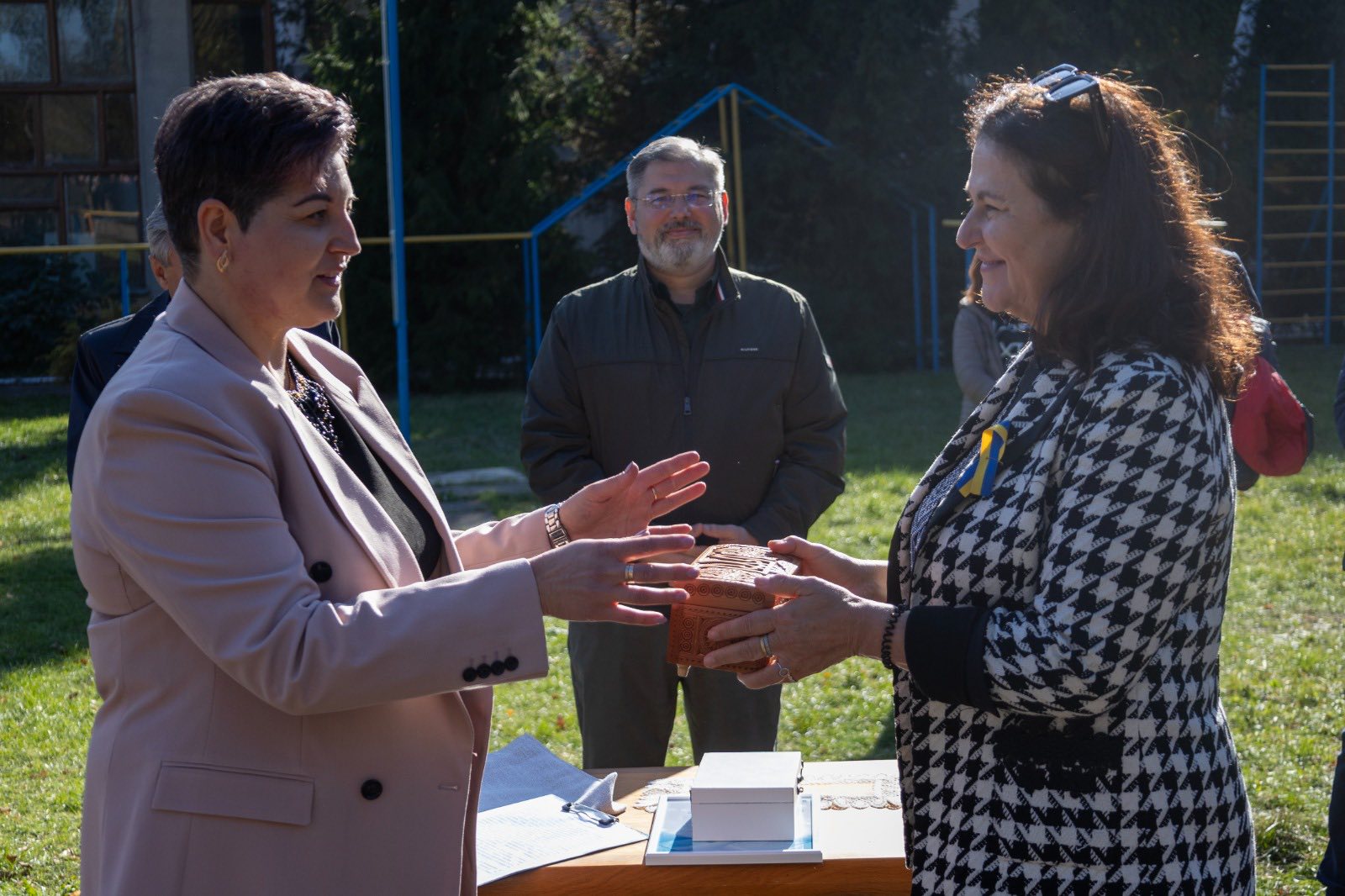 Katarína Mathernová during her visit to Bukovyna (photo: facebook.com/kmathernova)
Katarína Mathernová during her visit to Bukovyna (photo: facebook.com/kmathernova)
— There have already been two meetings in Istanbul, but their only real results were the exchange of the POWs and other humanitarian, but not political, outcomes. As of now, how does the European Union view this process? Do you fully agree that Russia is just imitating their desire to negotiate with absolutely no real intention of stopping the war now?
— I agree that all indications point to Russia not being interested in stopping the war or even pausing the war.
There are, however, important meetings ahead of us in the second part of June, starting with the G7 Summit in Canada, where there is going to be a separate meeting with President Zelenskyy, who is traveling there. There is going to be a NATO summit in the Hague, where, apart from increasing non-US member states of NATO expenditure on defense, obviously, Ukraine will be one of the key topics for discussion.
And then it's followed by a few days later, the European Summit of EU leaders in Brussels. In the meantime, the Coalition of the Willing, I'm sure, will be meeting in various formats. So I do believe that we are going to be smarter at the end of June than we are now.
Having said that, I just want to go back to the beginning of your question that I am very happy that at least the prisoners of war that were able to return, mothers saw their sons and wives, their husbands and sisters, their brothers, and it's great that at least the prisoner exchange is ongoing, that at least some people were able to see their loved ones after years or after a long time of captivity.
— How effective could any EU sanctions be in really influencing the behavior of the Kremlin if they are not accompanied by really decisive measures from the US?
— The EU is already on its 17th package. Two weeks ago, the 17th package of sanctions was adopted. it. I think it was with quite substantial amounts of listings for the shadow fleet, for individual and company restrictive measures.
The 18th package is under preparation. According to the indications that President von der Leyen publicly stated, we are looking at the oil price cap, we are looking at the Nord Stream pipeline, we are looking at banking transactions, and, furthermore, the shadow fleet vessels. But the exact shape of the measures is going to be a close hold until it's decided.
As you know, sanctions are subject to unanimous approval in the European Union, and so far, we have managed to adopt 17 packages.
Until now, we have always imposed sanctions together with the US and other partners. And I know the Ukrainian authorities, as well as European leaders, are engaging with the US. And we all very much hope that this trend will continue, because it would be more effective, as it has already. I often get the question, are the sanctions effective? Well, we wouldn't be seeing the fact that Russia cannot tap into its supply chain for the various weapons, and they are substituting it with domestic production if the sanctions didn't work. And for example, the freezing of the central bank assets at the very beginning of the full-scale invasion was also a very decisive step.
Let me just finish by saying there is no question that they will be more effective if it's done. There's no question about that.
— In the current geopolitical reality, given the changing approaches of the United States to international policy, to the world affairs. Is Europe ready to take on the role of the leader of the whole Western world?
— How about if we rephrase it to say: Is Europe ready to take the lead in its own defense?
— Yes.
— And I believe so. I think that in the last three years, things happened that none of us thought were even possible without the full-scale invasion.
— In the sphere of defense, or not only?
— In general. I never would have thought that the agreement on the different types of sanctions would have been possible. I didn't think we would have the European Peace Facility channeling Russian frozen assets directly to your defense industry. We just did a 1 billion euro package for the Ukrainian defense industry from proceeds from Russian frozen assets. And in general, the sort of active approach to the new geopolitical environment, the coalition of the willing discussion.
So I think that these are all indications that Europe is ready. The one issue where I share people's worry is the speed of our ability to take charge, but in terms of rules-based order and values-based politics, that is very much there. We have had a very positive rapprochement with the United Kingdom, which left the Union some years ago, and strong ties with Canada, Australia, New Zealand, Japan, South Korea, and other partners that watch very much with worry both the destruction that Russia is bringing about and also the pivot of the United States away from its traditional alliances.
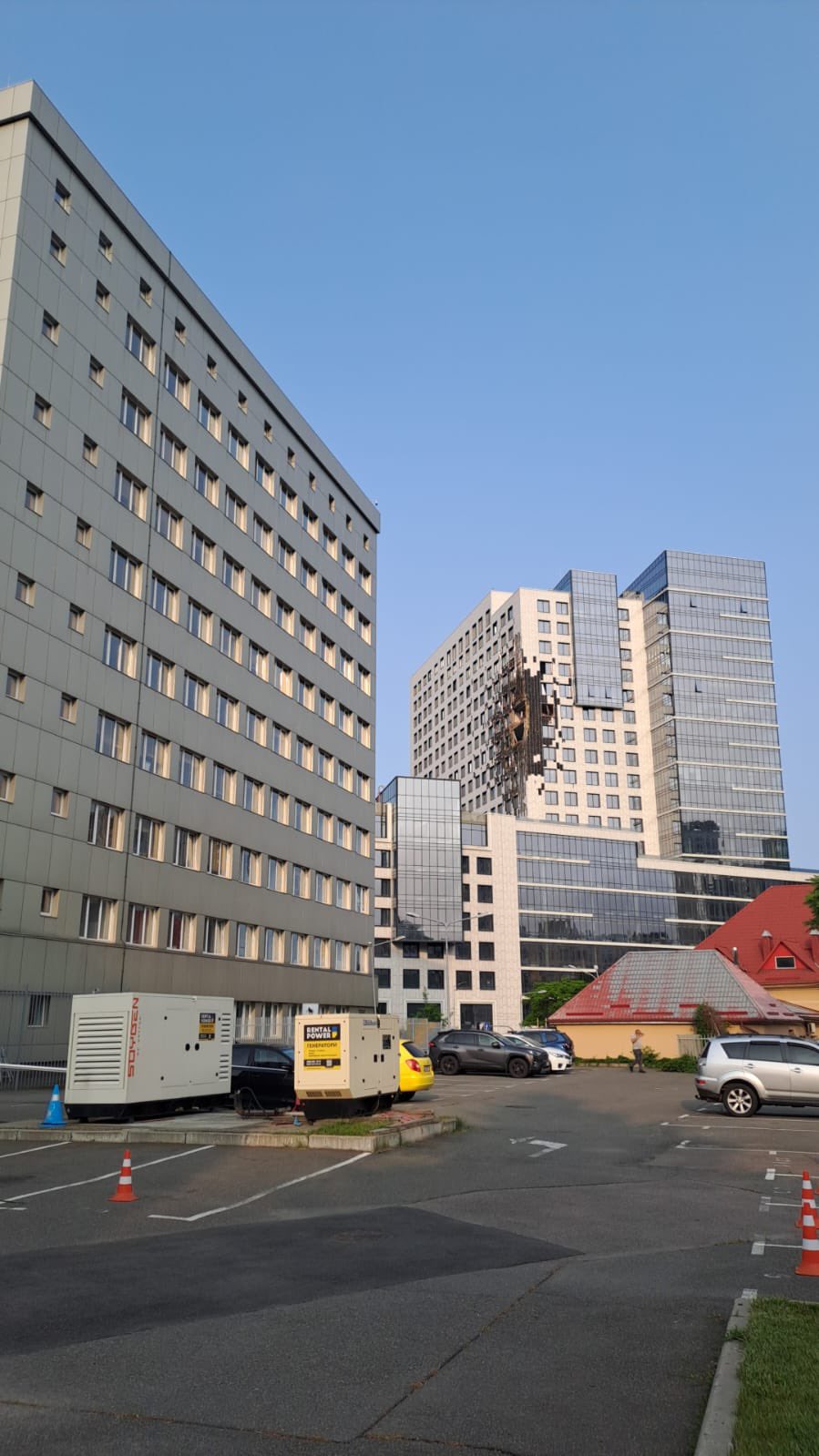
In the foreground is the EU Delegation building, and in the background is a building damaged by a Russian strike on the night of June 10 (photo: facebook.com/kmathernova)
— So, can we rightfully say that Europe has woken up as so many people said and wrote after the famous Munich conference, the famous speech by the famous vice president?
— I believe so. But I would indeed like to see more speed in all the developments because, for the people who were killed last night, it's already too late. So let's let it not be too late for the ones who are around.
— I think that one of the problems with the speed may be because it may be difficult for many EU leaders, especially from the nations further to the West, to fully explain to their voters the necessity to spend money on defense but not on social welfare. Unlike Putin, they are elected leaders and have elections every several years. Do you think that they will manage to explain that we cannot plan something to be done till 2045, that it needs to be done now?
— I think that one thing is what Putin has been doing in Ukraine. Another thing is the signals from our traditional ally and defender, the United States, so I think the European leaders are there. Now they need to work hard to explain it to the population.
— Ukraine and the EU have set ambitious goals for this year in the accession process. However, the progress has stalled due to the position of one country, and this is Hungary. Do you believe that it is still possible to open all the clusters of the negotiations this year under the current political circumstances?
— I will say I hope so. The indications from colleagues are that there are various ways to go about it, and the plan is still to open the first three and then the additional three clusters, still under the Danish presidency. So that's still Plan A, or Plan A+, or Plan A*.
— For very understandable reasons, the issues in Ukraine that you used to pay a lot of attention to before the full-scale war, like anti-corruption efforts, judicial reform, all different types of reforms, have now taken, so to speak, a back seat, at least publicly…
— Do you think that the issues of the rule of law, anti-corruption efforts have taken publicly back seat?
— I think publicly, yes. At least, this may be a perception of the broad public.
— I think that we are very actively discussing in the Fundamentals cluster all issues of judicial reform, prosecutorial reform, and anti-corruption actions. We actively support civil society that plays the watchdog function and work with the government on this. Under the Ukraine Facility, we have different benchmarks that include issues of judicial reform and anti-corruption and the rule of law in a broad sense.
— Still, are there any spheres where you still would like to see a bit more progress that could be achieved even in these difficult conditions?
— I think that Ukraine has made a lot of efforts in resetting and relaunching its judiciary. And I think that the surveys I've seen among businesses demonstrate there has been progress, the judicial self-government entities are relaunched, etc. But, I think there are still issues that need to be finalized, and that's the relaunch of the Supreme Court, finishing the appointments for the Constitutional Court and the High Anti-corruption Court, and setting up the High Administrative Court.
I don't think the war is necessarily a barrier to it, to really take the benefits of having a relaunched judicial system. It started back in 2016, now it's time to finalize it.
And two other areas I would also mention. One is to continue decentralization. And I think that's been one of the most impactful reforms.
— Do you mean new legislation or its implementation?
— Implementation of the legislation. There is a plan to set up the perfect bodies, and you need to then have a good sort of division of responsibilities between the local, regional, and national levels, etc. So I think that is an important reform we are supporting with our technical assistance, but also closely watching. It's also part of the criteria under the Ukraine Facility.
And the third one – there is a number of others – but I think it's important to continue with energy reforms: regulation, market coupling, and sort of big issues on energy and general management of state assets.
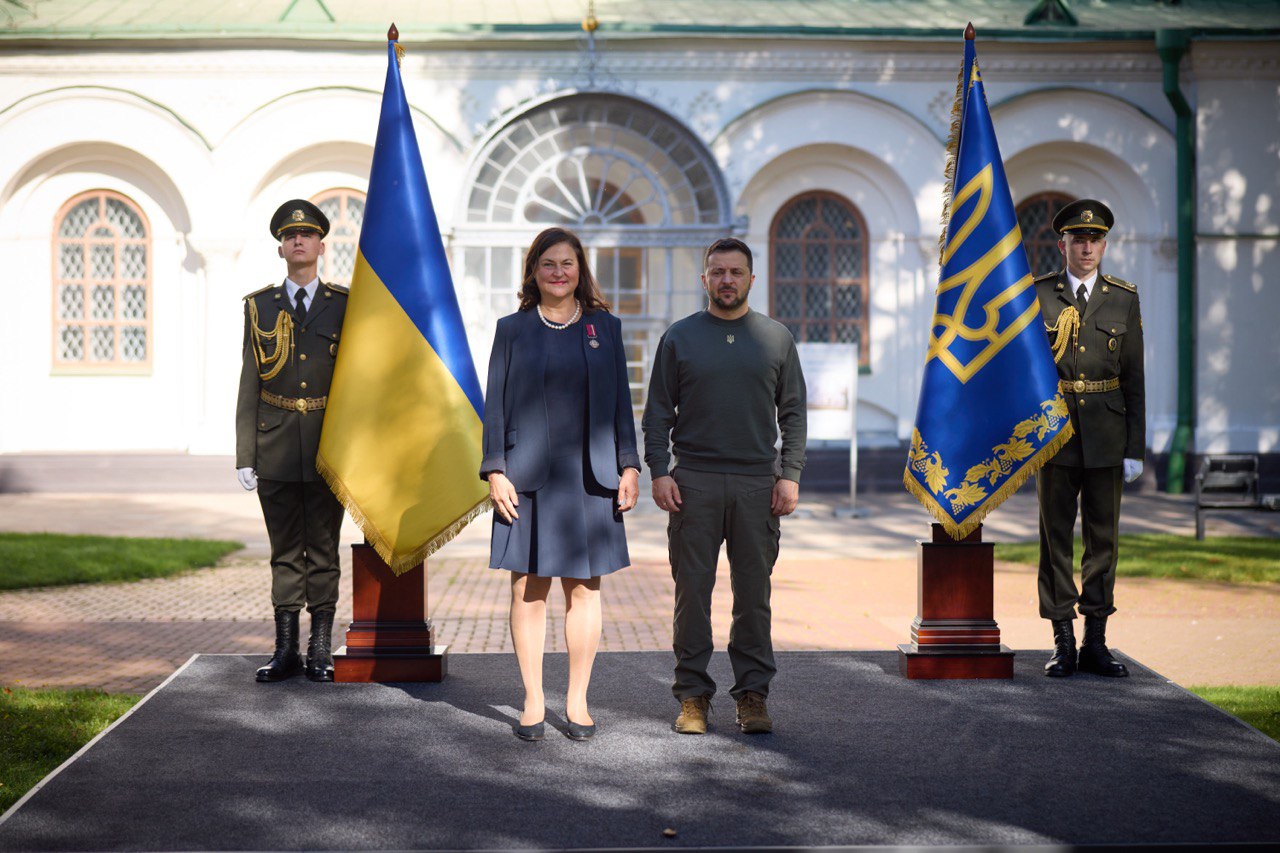 Katarína Mathernová and President Volodymyr Zelenskyy (photo: president.gov.ua)
Katarína Mathernová and President Volodymyr Zelenskyy (photo: president.gov.ua)
— Can we, Ukrainians, be 100% sure that even in the case of a ceasefire or a long-term ceasefire, the EU will keep helping us as much as you do now, keeping our economy afloat, helping us to maintain our large army, to be able to defend ourselves, restore the infrastructure and so on? What some people say is that if the Europeans, even the Europeans, see that, okay, there are no more attacks, no fighting on the front line, their population will say: why help Ukraine anymore if they're not fighting anymore?
— First of all, there are no 100% guarantees in anything in life, right? So if you ask me for a 100% guarantee, I'm afraid I cannot do that. But I think that we do recognize what is the difference between a temporary ceasefire and a final settlement.
And you do not have an interest in having a protracted ceasefire. You know, the line when a ceasefire turns into a frozen conflict is a touchy one. So, I think that in case we would be forgetting that it's a touchy line, I'm sure that the Ukrainian leadership would remind everybody that a ceasefire is, by definition, a reprieve for the fighting sides. But I don't think that by now anybody has an illusion about the intentions of Vladimir Putin.
— The final, more personal question. You travel a lot across different regions of Ukraine. Which of these, more or less recent trips, have stood out to you most?
— Dnipro was very, very interesting and impactful. I saw a lot of IDPs. Another one – when we were close to the border in the Chernihiv region, we were in the military dugouts, and that was also very interesting to me. And then, of course, any time I go visit Lviv and stop at either Superhumans or at Unbroken, that always leaves a strong impression. And hope.
